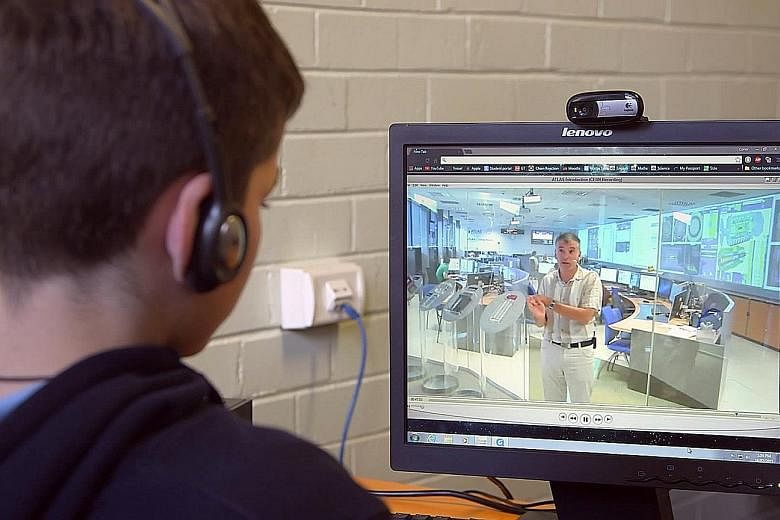During class breaks at Australia's Aurora College, the students talk and play just like those at any other high school - even though they are separated by hundreds of kilometres and their playground does not physically exist.
This is Australia's first virtual school, designed to cater to students who live in rural areas and are too far from a traditional brick-and-mortar school to take the subjects they want or to access advanced classes.
The school's 200 students live in towns and on farms across the state of New South Wales. Many live hundreds of kilometres apart from some of their closest friends.
Since it started in 2015, the school has proved a resounding success. It is now seen as a potential model for city schools which may want to share teaching loads or allow students to take online subjects at schools other than their own.
Aurora's principal, Mr Chris Robertson, has been a teacher for about 30 years but described his role at the school as the "most satisfying and challenging role that I have had in my career".
"We are providing opportunities for these kids that they would not otherwise be able to access," he told The Straits Times.
"What we are doing here is making a difference. Our aim is to use technology to enable us to replicate as closely as possible what students experience in a normal classroom."
He added: "There are lessons here not only for other large geographic areas but metropolitan schools as well. We are creating something that the world should sit up and take notice of."
Aurora has 36 teachers from across the state and its students come from 64 different schools. It has grown rapidly from 160 students in 2015 and is expected to have 240 students next year.
It offers advanced classes in English, mathematics and science for students in years 7 to 10 - aged 12 to 16 - who have passed the state's entry exams for selective schools.
It also offers classes for students in years 11 and 12 - aged 16 to 18 - whose local schools do not offer their desired subjects. This includes advanced maths, advanced English, chemistry, physics, agriculture, economics and languages such as Italian and, starting from next year, Japanese and Korean.
The school has virtual classrooms, lecture halls, playgrounds and assemblies - all using 3D technology that replicates their physical counterparts.
Experts from around Australia and the world regularly address the students in online master classes. These have included lectures by an experimental physicist speaking from the control room of the Large Hadron Collider on the French-Swiss border, as well as a European human rights lawyer, staff from Australia's science agency, the CSIRO, and lecturers from Australian universities.
Unlike many other virtual learning environments, the timetable matches that at the student's local school. This allows students to easily integrate classes at Aurora and at their local school.
In the town of Kyogle, a community of about 9,000 in the state's far north, several local high school students have enrolled at Aurora.
A year 9 student, Nutthinee Sirisin, who this year started taking classes at Aurora, said she believed her studies had benefited from the experience. "I find it's a lot easier to work, everything is lined up, it's all organised and it's really quiet," she told the local Northern Star newspaper earlier this year.
The students at Aurora have formed close - albeit online - friendships. Twice a year, they meet for a week-long camp and meet their friends in person.
Mr Robertson said the school allowed students to remain connected to their local communities and schools without missing the educational opportunities available in bigger cities. "Our kids are by and large highly motivated and appreciate being part of a cohort of like-minded students. They appreciate being provided with something much bigger than what they are provided with at their local school."

